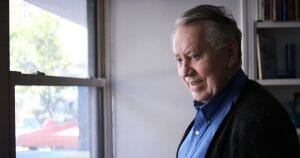Born in New Jersey during the Great Depression, Feeney shoveled snow and sold Christmas cards door-to-door as a child to make money. He served as a radio operator in the U.S. Air Force during the Korean war — being posted to Japan gave him a taste of life overseas. On his return he used his G.I. Bill benefits to attend Cornell University, and sold sandwiches to frat houses to supplement his G.I. benefits. After graduation he moved to Europe, where he ran into a fellow Cornell student. Together they started a new business: operating Duty Free Shops to sell liquor to U.S. Navy personnel around the Mediterranean.
Duty Free — which allows for the sale of goods without import/export duties when the buyer is leaving a country — worked well, and Feeney was a pioneer in the field. He quickly expanded the operations to cars and tobacco. His company, the Duty Free Shoppers Group, expanded rapidly, and in the early 1960s won exclusive rights to duty-free sales in Hawaii, marketing to Japanese travelers. DFS Group — and Feeney — made billions, and then he and his partner sold the company to the Louis Vuitton Moët Hennessy luxury goods conglomerate. That was after Feeney got his second big idea: to give away his billions. He initially did it anonymously, and had transferred his DFS ownership stake to a charity he created, The Atlantic Philanthropies; even his partner didn’t know Feeney himself didn’t own any part of the business anymore. Cornell University alone got nearly a billion dollars, more than enough to create the university’s New York City Tech Campus on Roosevelt Island. Feeney’s heritage is Irish, and he gave about a billion to schools in both Northern Ireland and the Republic of Ireland, particularly working to promote peace between the two.

The Atlantic Philanthropies was chartered in Bermuda so he wouldn’t have to reveal his identity — even though that meant he couldn’t take tax deductions for his charity. In all, he gave away more than $8 billion, finishing in 2016 — four years ahead of his goal — making it the largest foundation in history to intentionally grant its entire endowment. Feeney spent the rest of his life living modestly. Forbes marveled that his low-key approach, rather than glorifying himself by having his name put on buildings. That made him the “James Bond of of Philanthropy”, the magazine said. He kept only $2 million — more than enough to live the rest of his life. The New York Times noted in 2017 that “Until he was 75, he traveled only in coach, and carried reading materials in a plastic bag.” He didn’t own a car or a house, preferring to rent an apartment, and wore a $10 Casio watch.
Feeney’s philosophy was simple: “I had one idea that never changed in my mind: that you should use your wealth to help people.” But why not hold onto the money while still alive? “I cannot think of a more personally rewarding and appropriate use of wealth than to give while one is living, to personally devote oneself to meaningful efforts to improve the human condition.” While he didn’t want publicity, to ensure accuracy he cooperated with a biographer who wrote The Billionaire Who Wasn’t: How Chuck Feeney Made and Gave Away a Fortune Without Anyone Knowing * (2007), and an Irish documentary, Secret Billionaire: The Chuck Feeney Story (viewable below). Charles Francis Feeney died in San Francisco on October 9. He was 92.
